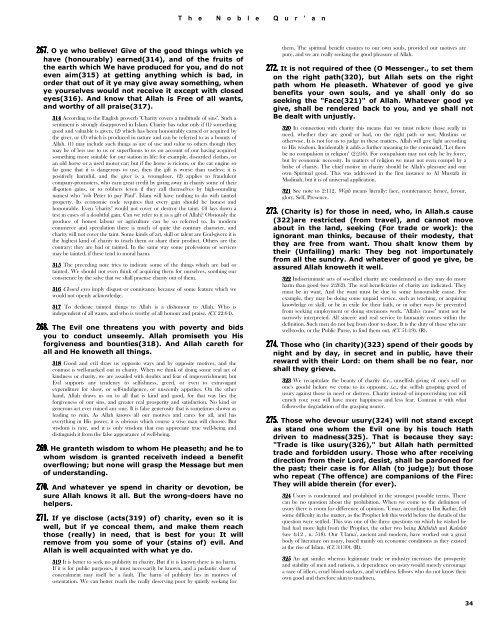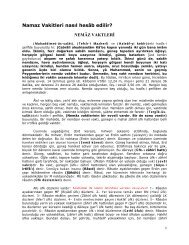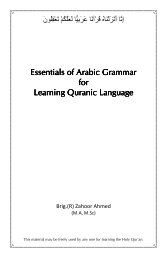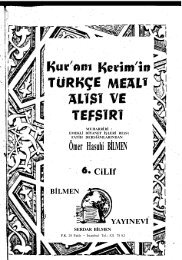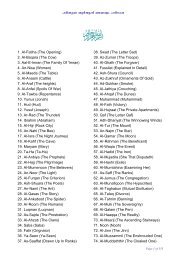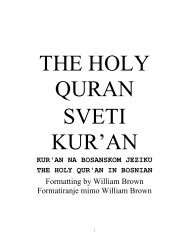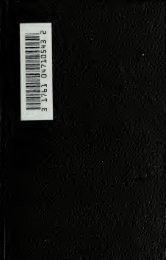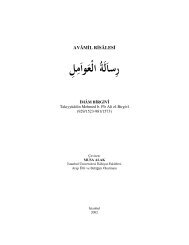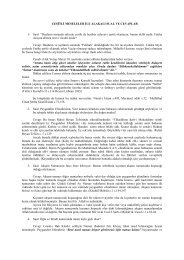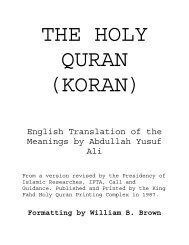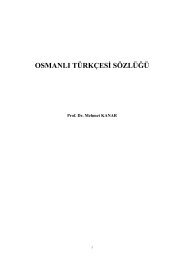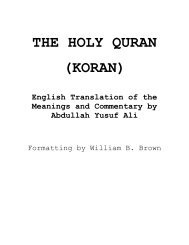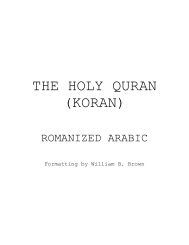English Quran with Commentaries By Yusuf-ali - HolyBooks.com
English Quran with Commentaries By Yusuf-ali - HolyBooks.com
English Quran with Commentaries By Yusuf-ali - HolyBooks.com
- No tags were found...
Create successful ePaper yourself
Turn your PDF publications into a flip-book with our unique Google optimized e-Paper software.
T h e N o b l e Q u r ’ a n<br />
267. O ye who believe! Give of the good things which ye<br />
have (honourably) earned(314), and of the fruits of<br />
the earth which We have produced for you, and do not<br />
even aim(315) at getting anything which is bad, in<br />
order that out of it ye may give away something, when<br />
ye yourselves would not receive it except <strong>with</strong> closed<br />
eyes(316). And know that Allah is Free of all wants,<br />
and worthy of all praise(317).<br />
314 According to the <strong>English</strong> proverb "Charity covers a multitude of sins". Such a<br />
sentiment is strongly disapproved in Islam. Charity has value only if (1) something<br />
good and valuable is given, (2) which has been honourably earned or acquired by<br />
the giver, or (3) which is produced in nature and can be referred to as a bounty of<br />
Allah. (1) may include such things as are of use and value to others though they<br />
may be of less use to us or superfluous to us on account of our having acquired<br />
something more suitable for our station in life: for example, discarded clothes, or<br />
an old horse or a used motor car; but if the horse is vicious, or the car engine so<br />
far gone that it is dangerous to use, then the gift is worse than useless; it is<br />
positively harmful, and the giver is a wrongdoer. (2) applies to fraudulent<br />
<strong>com</strong>pany-promoters, who earn great credit by giving away in charity some of their<br />
ill-gotten gains, or to robbers (even if they call themselves by high-sounding<br />
names) who "rob Peter to pay Paul". Islam will have nothing to do <strong>with</strong> tainted<br />
property. Its economic code requires that every gain should be honest and<br />
honourable. Even "charity" would not cover or destroy the taint. (3) lays down a<br />
test in cases of a doubtful gain. Can we refer to it as a gift of Allah? Obviously the<br />
produce of honest labour or agriculture can be so referred to. In modern<br />
<strong>com</strong>merce and speculation there is much of quite the contrary character, and<br />
charity will not cover the taint. Some kinds of art, skill or talent are God-given: it is<br />
the highest kind of charity to teach them or share their product. Others are the<br />
contrary: they are bad or tainted. In the same way some professions or services<br />
may be tainted, if these tend to moral harm.<br />
315 The preceding note tries to indicate some of the things which are bad or<br />
tainted. We should not even think of acquiring them for ourselves, soothing our<br />
conscience by the salve that we shall practise charity out of them.<br />
316 Closed eyes imply disgust or connivance because of some feature which we<br />
would not openly acknowledge.<br />
317 To dedicate tainted things to Allah is a dishonour to Allah. Who is<br />
independent of all wants, and who is worthy of all honour and praise. (Cf. 22:64).<br />
268. The Evil one threatens you <strong>with</strong> poverty and bids<br />
you to conduct unseemly. Allah promiseth you His<br />
forgiveness and bounties(318). And Allah careth for<br />
all and He knoweth all things.<br />
318 Good and evil draw us opposite ways and by opposite motives, and the<br />
contrast is well-marked out in charity. When we think of doing some real act of<br />
kindness or charity, we are assailed <strong>with</strong> doubts and fear of impoverishment; but<br />
Evil supports any tendency to selfishness, greed, or even to extravagant<br />
expenditure for show, or self-indulgence, or unseemly appetites. On the other<br />
hand, Allah draws us on to all that is kind and good, for that way lies the<br />
forgiveness of our sins, and greater real prosperity and satisfaction. No kind or<br />
generous act ever ruined any one. It is false generosity that is sometimes shown as<br />
leading to ruin. As Allah knows all our motives and cares for all, and has<br />
everything in His power, it is obvious which course a wise man will choose. But<br />
wisdom is rare, and it is only wisdom that can appreciate true well-being and<br />
distinguish it from the false appearance of well-being.<br />
269. He granteth wisdom to whom He pleaseth; and he to<br />
whom wisdom is granted receiveth indeed a benefit<br />
overflowing; but none will grasp the Message but men<br />
of understanding.<br />
270. And whatever ye spend in charity or devotion, be<br />
sure Allah knows it all. But the wrong-doers have no<br />
helpers.<br />
271. If ye disclose (acts(319) of) charity, even so it is<br />
well, but if ye conceal them, and make them reach<br />
those (really) in need, that is best for you: It will<br />
remove from you some of your (stains of) evil. And<br />
Allah is well acquainted <strong>with</strong> what ye do.<br />
319 It is better to seek no publicity in charity. But if it is known there is no harm.<br />
If it is for public purposes, it must necessarily be known, and a pedantic show of<br />
concealment may itself be a fault. The harm of publicity lies in motives of<br />
ostentation. We can better reach the really deserving poor by quietly seeking for<br />
them. The spiritual benefit ensures to our own souls, provided our motives are<br />
pure, and we are really seeking the good pleasure of Allah.<br />
272. It is not required of thee (O Messenger., to set them<br />
on the right path(320), but Allah sets on the right<br />
path whom He pleaseth. Whatever of good ye give<br />
benefits your own souls, and ye shall only do so<br />
seeking the "Face(321)" of Allah. Whatever good ye<br />
give, shall be rendered back to you, and ye shall not<br />
Be dealt <strong>with</strong> unjustly.<br />
320 In connection <strong>with</strong> charity this means that we must relieve those really in<br />
need, whether they are good or bad, on the right path or not, Muslims or<br />
otherwise. It is not for us to judge in these matters. Allah will give light according<br />
to His wisdom. Incidentally it adds a further meaning to the <strong>com</strong>mand, "Let there<br />
be no <strong>com</strong>pulsion in religion" (2:256). For <strong>com</strong>pulsion may not only be by force,<br />
but by economic necessity. In matters of religion we must not even <strong>com</strong>pel by a<br />
bribe of charity. The chief motive in charity should be Allah's pleasure and our<br />
own Spiritual good. This was addressed in the first instance to Al Mustafa in<br />
Madinah, but it is of universal application.<br />
321 See note to 2:112, Wajh means literally: face, countenance; hence, favour,<br />
glory, Self, Presence.<br />
273. (Charity is) for those in need, who, in Allah.s cause<br />
(322)are restricted (from travel), and cannot move<br />
about in the land, seeking (For trade or work): the<br />
ignorant man thinks, because of their modesty, that<br />
they are free from want. Thou shalt know them by<br />
their (Unfailing) mark: They beg not importunately<br />
from all the sundry. And whatever of good ye give, be<br />
assured Allah knoweth it well.<br />
322 Indiscriminate acts of so-called charity are condemned as they may do more<br />
harm than good (see 2:262). The real beneficiaries of charity are indicated. They<br />
must be in want. And the want must be due to some honourable cause. For<br />
example, they may be doing some unpaid service, such as teaching, or acquiring<br />
knowledge or skill, or be in exile for their faith, or in other ways be prevented<br />
from seeking employment or doing strenuous work. "Allah's cause" must not be<br />
narrowly interpreted. All sincere and real service to humanity <strong>com</strong>es <strong>with</strong>in the<br />
definition. Such men do not beg from door to door. It is the duty of those who are<br />
well-to-do, or the Public Purse, to find them out. (Cf. 51:19). (R).<br />
274. Those who (in charity)(323) spend of their goods by<br />
night and by day, in secret and in public, have their<br />
reward <strong>with</strong> their Lord: on them shall be no fear, nor<br />
shall they grieve.<br />
323 We recapitulate the beauty of charity (i.e., unselfish giving of one's self or<br />
one's goods) before we <strong>com</strong>e to its opposite, i.e., the selfish grasping greed of<br />
usury against those in need or distress. Charity instead of impoverishing you will<br />
enrich you: you: will have more happiness and less fear. Contrast it <strong>with</strong> what<br />
follows-the degradation of the grasping usurer.<br />
275. Those who devour usury(324) will not stand except<br />
as stand one whom the Evil one by his touch Hath<br />
driven to madness(325). That is because they say:<br />
"Trade is like usury(326)," but Allah hath permitted<br />
trade and forbidden usury. Those who after receiving<br />
direction from their Lord, desist, shall be pardoned for<br />
the past; their case is for Allah (to judge); but those<br />
who repeat (The offence) are <strong>com</strong>panions of the Fire:<br />
They will abide therein (for ever).<br />
324 Usury is condemned and prohibited in the strongest possible terms. There<br />
can be no question about the prohibition. When we <strong>com</strong>e to the definition of<br />
usury there is room for difference of opinion. 'Umar, according to Ibn Kathir, felt<br />
some difficulty in the matter, as the Prophet left this world before the details of the<br />
question were settled. This was one of the three questions on which he wished he<br />
had had more light from the Prophet, the other two being Khilafah and Kafalah<br />
(see 4:12 , n. 518). Our 'Ulama', ancient and modern, have worked out a great<br />
body of literature on usury, based mainly on economic conditions as they existed<br />
at the rise of Islam. (Cf. 3:130). (R).<br />
325 An apt simile: whereas legitimate trade or industry increases the prosperity<br />
and stability of men and nations, a dependence on usury would merely encourage<br />
a race of idlers, cruel blood-suckers, and worthless fellows who do not know their<br />
own good and therefore akin to madmen.<br />
34


